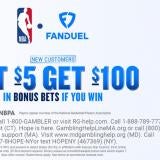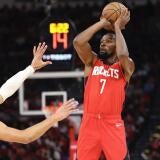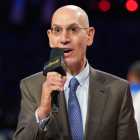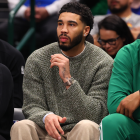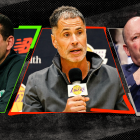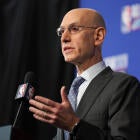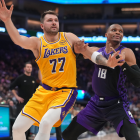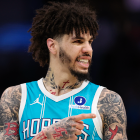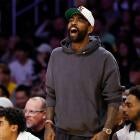Anthony Davis trade: Debating winner of Lakers-Pelicans deal, which max free agent would fit best alongside LeBron and A.D.
In our latest 3-Man Weave, we also touch on what New Orleans should do with its newly acquired No. 4 pick in the NBA Draft
Anthony Davis got what he wanted. Two days after the NBA Finals concluded, the New Orleans Pelicans agreed to trade him to the Los Angeles Lakers for Brandon Ingram, Lonzo Ball, Josh Hart and a million draft picks.
OK, fine, it was not a million draft picks. It just feels like it was. The Lakers will reportedly send the Pelicans the No. 4 pick in this Thursday's draft, a top-eight protected 2021 first-round pick (which becomes unprotected in 2022), first-round swap rights in 2023 and a 2024 first-round pick (which New Orleans can defer to 2025). Whew.
This is a blockbuster. Davis is just 26, and one of the world's best players on both ends. He and LeBron James are a terrifying duo, provided they stay healthy. The Lakers have work to do, though, as there are only three other players on the roster: Kyle Kuzma, Mo Wagner and Isaac Bonga.
Los Angeles is betting that it will find a way to field a championship-caliber supporting cast. If they don't, it will be a disaster. The Pelicans, meanwhile, are turning the page on the Davis era by committing to youth, upside and flexibility. We asked three CBS Sports NBA writers for their thoughts on the deal and what is next for both teams.
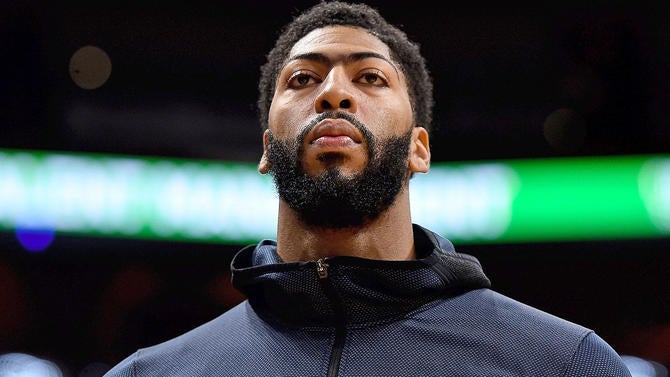
1. Who made out better in the Anthony Davis trade: Lakers or Pelicans?
James Herbert: They both got what they wanted. The Pelicans won the negotiation, but that's different from winning the trade. Los Angeles was desperate for a superstar to pair with James, and New Orleans used that desperation to drain the franchise of its future draft picks. David Griffin's front office should get extra points for creativity -- having swap rights in 2023 and the option to defer the 2024 unprotected pick to 2025 means that there is significant downside for the Lakers here. There was already immense pressure on Rob Pelinka to quickly assemble a contender; now there is pressure to remain in contention even when James' career winds down, with hardly any draft assets at his disposal.
DJ Siddiqi: As of this current moment, the Pelicans got the better end of the deal. I almost considered this a push considering both teams got exactly what they wanted out of this deal. The Lakers acquired Anthony Davis, a top-five player to pair with LeBron James, which immediately makes them championship favorites for next season. Meanwhile, the Pelicans have a plethora of first-round draft picks to pair alongside Zion Williamson (most likely) and several bright young pieces in Brandon Ingram, Lonzo Ball and Josh Hart. Not to mention they hold the No. 4 overall pick in this year's draft that they can use to draft another potential star or dangle as a trade piece to put them in "win now" mode.
Taking everything into account, the possibility of Davis leaving after the 2019-20 season still looms and the fact that the Lakers don't have the proper cap space to fill out their roster is also a major concern. Meanwhile, although the Pelicans won't be winning a championship in 2020, they have the most potential of any young squad out there and could be contending for titles within the next few years. When you factor in all of the caveats and protections relating to the Pelicans' first-round pick acquisitions from the Lakers, it's hard to argue that New Orleans isn't better positioned for the long run.
With that said, if you ask me this question a year from now and the Lakers won a title with LeBron and A.D. -- even if it's just one title during their time together -- then it's the Lakers who emerge as the winners of this trade.
Jack Maloney: In the short term, it's very obviously the Lakers. They got Anthony Davis, who is not only one of the 10 best players in the league, but a perfect fit alongside LeBron James, and have vaulted from the lottery to championship contender in what figures to be a wide-open season. They still have plenty of work to do to fill out the rest of the roster, and the Lakers' front office's track record in that regard is cause for some genuine concern. Still, LeBron and Davis is as good of a 1-2 punch as anyone in the league will have for the next few seasons. With an absolute haul of picks and swap rights the Pelicans received in the deal, however, they could be the ones laughing in the long run, especially if the Lakers don't find the immediate championship success they're after.
2. Which max free agent would be the ideal fit alongside LeBron and A.D. -- if the Lakers can afford it?
Herbert: Kemba Walker seems like the most realistic one, if the Lakers can actually delay the completion of the trade until July 30. The Lakers don't have a backcourt right now, and Walker would make sense because he brings playmaking and shooting. There is an off-court component to this, too: Walker is a low-maintenance star and a natural leader. Los Angeles needs someone like him after last year's circus.
Siddiqi: Call me crazy, but I say Kyrie Irving is the best fit alongside LeBron and A.D. If you think that Kyrie's public reconciliation with LeBron James wasn't a big deal, you couldn't be further wrong. Irving realized real quickly in Boston that he wasn't cut out to be a true leader and that he's better cast as a supporting player on a championship-level squad. LeBron and Kyrie have already won a title together and they went to three consecutive NBA Finals as a duo. If Irving is the third-best player on this Lakers squad, it not only alleviates the pressure off of him, it also gives him the opportunity to thrive on offense with defenders focusing on LeBron and Davis over him.
When you factor in that Irving could make a killing on the pick-and-roll with Davis while spelling LeBron as the primary ball-handler -- as they both did in Cleveland -- Irving could be the big missing piece that really catapults the Lakers into being clear-cut championship favorites for 2020.
Maloney: I think James' suggestion of Kemba Walker is a smart one. The Lakers need a point guard, and Walker would provide a steady presence. He's durable -- he's only missed six games the last two seasons -- can both facilitate and is a good enough shooter to space the floor and be a spot-up threat. Plus, Walker has talked about being open to taking less money, which may be important if the trade gets finalized on July 6 instead of July 30. Of course he said so in regards to staying with the Hornets, so the same generosity may not apply to the Lakers, but none of the other max players has even hinted at that possibility.
3. Which direction should the Pelicans go next -- keep their new No. 4 pick or package it in a trade to acquire a proven star?
Herbert: Depends on the star. If it's Bradley Beal, who turned 26 on Tuesday, sure. If it's LaMarcus Aldridge, who turns 34 next month, absolutely not. There is no consensus fourth pick in this draft, and New Orleans should definitely be open to trading down, particularly if it has zeroed in on a prospect it might be able to get later. The beautiful thing about the Pelicans' position, though, is that they don't need to go star-hunting right now. Zion Williamson is about to be their franchise player, and they can spend the next few years trying to find players who can grow with him and maximize his gifts.
Siddiqi: The Pelicans should trade the No. 4 overall pick for either an established veteran or a trade package that consists of more draft picks. The draft prospects after the top three of Zion Williamson, Ja Morant and RJ Barrett aren't exactly deep. The No. 4 overall prospect, Darius Garland, is a point guard coming off a serious MCL injury that limited him to just five games in his freshman season at Vanderbilt. The Pelicans don't have need for a point guard considering they just acquired Lonzo Ball from the Lakers and the fact that they intend to keep Jrue Holiday.
Acquiring a veteran player or a combo of draft picks will either put the team in "win now" mode or set them up even better for a deep future -- both better scenarios than acquiring a player of Garland's caliber with the No. 4 overall pick.
Maloney: There are a lot of questions about the depth of this draft, so it makes sense why the Pelicans would be open to moving the No. 4 pick. At the same time, that makes you wonder what teams would actually be willing to give up. A proven star seems like an unlikely return, and besides, with Davis, Nikola Mirotic and Julius Randle all gone, the Pelicans aren't exactly in win-now mode. Either moving back in the draft and trying to get multiple picks, or just simply taking the player they like the most at No. 4 seems like the best move for the timeline they're on.




